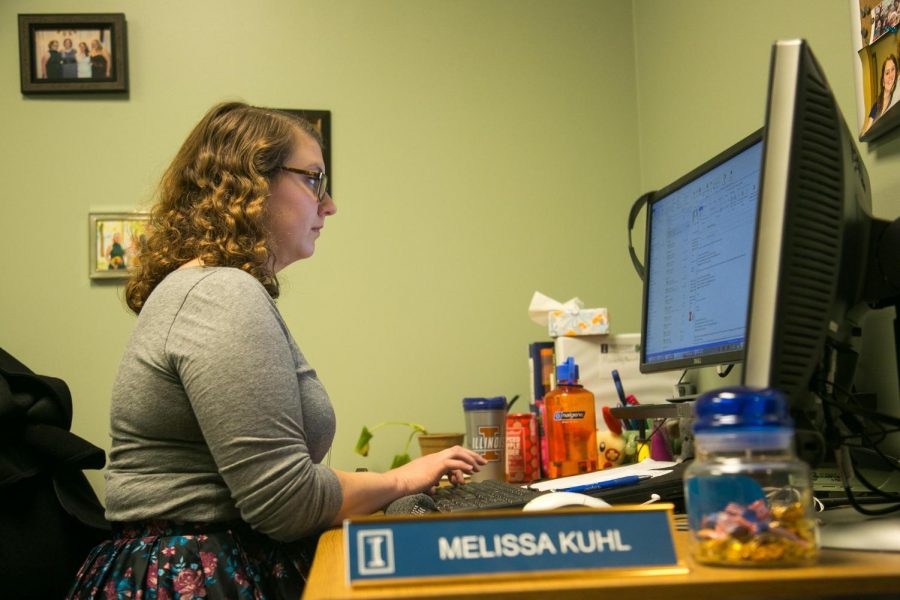A closer look at University Extension
Melissa Kuhl, publicity specialist at the Illinois Extension office, working at her desk on Nov. 10, 2017. University Extension covers every county within Illinois, with 1.5 million residents participating every year.
November 29, 2017
Educators at University Extension do everything from writing public health policy to running after-school activities for children across the state.
The University’s Extension branch, the flagship outreach program of the University, covers every county in Illinois. Extension is funded by a combination of federal, state and University funding, as well as various research grants when available.
Extension offices are equipped with Educators who run a wide variety of programs dedicated to addressing issues for Illinois residents in their respective county.
Champaign’s Extension office is run by six educators and is responsible for all Extension programs in the Champaign, Ford, Iroquois and Vermilion counties.
The unit covers four main areas of work, each handled by a single educator. The areas are Family Life, Horticulture, SNAP-Education and 4-H Youth Development.
Get The Daily Illini in your inbox!
4-H focuses on children aged 8-18 in Illinois. It runs out-of-school programs involving different activities, including robotics, public speaking, agriculture and more.
“It’s out of school and hands-on… anything with relation to ACES has a project related to it,” Ginger Boas, director of Champaign County Extension, said. “They learn life skills, teamwork, public speaking, they learn how to run a meeting… they learn from somebody that knows about it, and then they learn by doing.”
Boas added students who stay in 4-H are more likely to go to college, do not get in trouble as much, have a sense of belonging to a group and may decide to pick up certain activities as future careers.
“We have a pretty large program in the Champaign unit, 3,500 kids, there’s more to it than what the numbers show,” she said.
Caitlin Kownacki, Educator for SNAP-Education in Champaign County, is in charge of promoting healthy choices with regard to Illinois’ Supplemental Nutrition Assistance Program, the successor of its food stamp program.
“We are attached to public health, we do the actual teaching of curriculums… and then my job is to work within community systems to help build infrastructure that makes healthy choices into easy choices,” she said.
Kownacki works with agencies that provide services to low-income families, and makes sure their environment leads to healthy choices. She writes organizational and community policies to fulfil that goal.
“We exist in this way because we know that if you wanted to make a positive healthy behavior change, you should have the resources to do so,” she said.
Kownacki said there are five things that impact one’s ability to make a healthy behavioral change. She said that SNAP- Education has staff that focus on all five factors, to promote healthy living across the four counties Champaign is responsible for.
Chelsey Byers Gerstenecker is the Family Life Educator in Champaign’s office. Her specialty is aging issues.
“We do needs assessment in our communities to find out what kind of programs we should be developing,” she said. “Once we know what they are, we can address them and then we develop programs to address those needs.”
Gerstenecker often conducts workshops in relevant counties, promoting and teaching exercises that maintain mental productivity to senior citizens.
“We do a lot of interdisciplinary programming, including family life, nutrition and wellness,” Gerstenecker said. “So we do wellness programs and a webinar series during lunch so people can sit on their desks and get some education during their lunches.”
Gerstenecker’s work also includes life story writing programs, in which she encourages senior citizens to write about their lives for themselves to reflect on and for their friends and family to read.
“(The program) helps to guide them to write their life story. Research shows that it’s developmentally a good thing to reflect back on their life at later stages,” she said. “A lot of people want to write a life story for their family, but we have seen that they have done so much more. They made new friends and gained confidence.”
Gerstenecker said through the program she encouraged a former elementary schoolteacher to become confident enough to speak to adults, not just children.
“Because of this class, she gained confidence to actually go and be a reader at church,” she said. “You just never know the outcomes of these programs sometimes.”
Ryan Pankau, Horticulture educator, is responsible for all the different Extension horticulture programs and provides leadership to all its staff. Horticulture is the science of growing plants.
Their main programs are the master gardener and master naturalist programs. Master gardeners learn about plant maintenance in urban environments, while naturalists learn about more natural environments, like forests and prairies.
“To join the program you take a nine week training course, I take up some teaching, we bring in some folks from the University, some Parkland instructors and other experts,” he said. “Once they pass the course we consider them an intern, and they have to take about 60 hours of volunteer work on some of our projects.”
Pankau is also responsible for dispersing College of ACES research to the public. The main way he does this is by running a Horticulture hotline from April to October.
“We can answer any question about plants, gardening, insects, wildlife, anything, and they’re able to call in here,” Pankau said. “Our Master gardeners volunteer their time and answer their calls.”
All four educators regularly write educational articles for the News-Gazette and other online publications, discussing issues in areas of interest directly related to their educational backgrounds and the needs of the public.
Extension educators are also involved in the Sola Gratia community farm. Sola Gratia is a not-for-profit organization supported by a church. They grow organic vegetable and donate them to people who don’t have access to organic food.
Kownacki helps educate the recipients on how best to use their vegetables and Pankau helps the farm figure out better ways to grow as much as possible for the people they serve.
“Extension does all kinds of things everywhere, it’s kind of hard to name them all in one shot,” Pankau said.
Correction: This article previously misstated there were four Extension educators, but there is six. The Daily Illini regrets this error.







